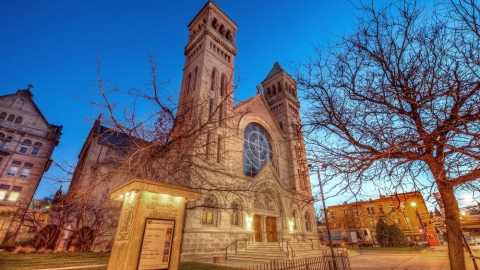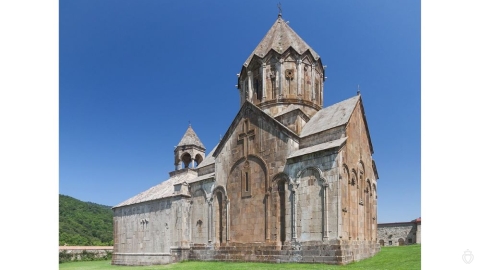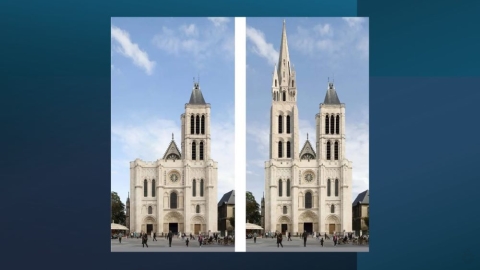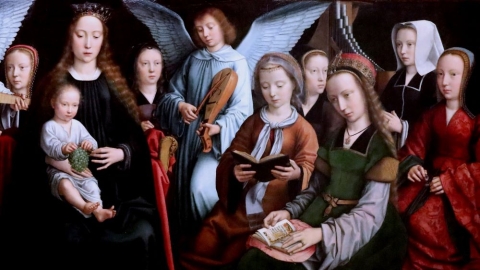Seventh Centenary of the Canonization of St. Thomas Aquinas (1)

Church of Santa Maria Novella in Florence
On the occasion of the 700th anniversary of the Angelic Doctor, FSSPX.News is publishing several texts showing the place of the Common Doctor in theology and in the teaching of the Church. The first text is a motu proprio by Pope St. Pius X “on the study of the doctrine of St. Thomas Aquinas in Catholic schools,” titled Doctoris Angelici.
“No true Catholic has ever ventured to call in question the opinion of the Angelic Doctor that: The regulation of studies is the special concern of the authority of the Holy See by which the universal Church is governed and the need is met by the establishment of Universities.” [1]
[Follow St. Thomas in teaching philosophy]
We have already discharged this great duty of Our office elsewhere, and more particularly on the 1st September, 1910, when in the Letter Sacrorum Antistitum, addressed to all Bishops and Superiors of Religious Orders duly charged with the duty of educating young men for the priesthood, We counselled them in the first place as follows:
So far as studies are concerned, it is Our will and We hereby explicitly ordain that the Scholastic philosophy be considered as the basis of sacred studies. . . . And what is of capital importance in prescribing that Scholastic philosophy is to be followed, We have in mind particularly the philosophy which has been transmitted to us by St. Thomas Aquinas.
It is Our desire that all the enactments of Our Predecessor in respect thereto be maintained in full force; and, where need be, We renew and confirm them and order them to be strictly observed by all concerned. Let Bishops urge and compel their observance in future in any Seminary in which they may have been neglected. The same injunction applies also to Superiors of Religious Orders.
Now because the word We used in the text of that letter recommending the philosophy of Aquinas was 'particularly,' and not 'exclusively,' certain persons persuaded themselves that they were acting in conformity to Our Will or at any rate not actively opposing it, in adopting indiscriminately and adhering to the philosophical opinions of any other Doctor of the School, even though such opinions were contrary to the principles of St. Thomas.
They were greatly deceived. In recommending St. Thomas to Our subjects as supreme guide in the Scholastic philosophy, it goes without saying that Our intention was to be understood as referring above all to those principles upon which that philosophy is based as its foundation.
For just as the opinion of certain ancients is to be rejected which maintains that it makes no difference to the truth of the Faith what any man thinks about the nature of creation, provided his opinions on the nature of God be sound, because error with regard to the nature of creation begets a false knowledge of God; so the principles of philosophy laid down by St. Thomas Aquinas are to be religiously and inviolably observed, because they are the means of acquiring such a knowledge of creation as is most congruent with the Faith [2].
Refuting all the errors of all the ages, and of enabling man to distinguish clearly what things are to be attributed to God and to God alone [3]. They also marvelously illustrate the diversity and analogy between God and His works, a diversity and analogy admirably expressed by the Fourth Lateran Council as follows: “The resemblance between the Creator and the creature is such that their still greater dissimilarity cannot fail to be observed” [4].
— For the rest, the principles of St. Thomas, considered generally and as a whole, contain nothing but what the most eminent philosophers and doctors of the Church have discovered after prolonged reflection and discussion in regard to the particular reasons determining human knowledge, the nature of God and creation, the moral order and the ultimate end to be pursued in life.
St. Thomas perfected and augmented still further by the almost angelic quality of his intellect all this superb patrimony of wisdom which he inherited from his predecessors and applied it to prepare, illustrate and protect sacred doctrine in the minds of men [5]. Sound reason suggests that it would be foolish to neglect it and religion will not suffer it to be in any way attenuated.
And rightly, because, if Catholic doctrine is once deprived of this strong bulwark, it is useless to seek the slightest assistance for its defense in a philosophy whose principles are either common to the errors of materialism, monism, pantheism, socialism and modernism, or certainly not opposed to such systems.
The reason is that the capital theses in the philosophy of St. Thomas are not to be placed in the category of opinions capable of being debated one way or another, but are to be considered as the foundations upon which the whole science of natural and divine things is based; if such principles are once removed or in any way impaired, it must necessarily follow that students of the sacred sciences will ultimately fail to perceive so much as the meaning of the words in which the dogmas of divine revelation are proposed by the magistracy of the Church.
We therefore desired that all teachers of philosophy and sacred theology should be warned that if they deviated so much as a step, in metaphysics especially, from Aquinas, they exposed themselves to grave risk.
We now go further and solemnly declare that those who in their interpretations misrepresent or affect to despise the principles and major theses of his philosophy are not only not following St. Thomas but are even far astray from the saintly Doctor.
If the doctrine of any writer or Saint has ever been approved by Us or Our Predecessors with such singular commendation and in such a way that to the commendation were added an invitation and order to propagate and defend it, it may easily be understood that it was commended to the extent that it agreed with the principles of Aquinas or was in no way opposed to them.
We have deemed it Our apostolic duty to make this declaration and order so that the clergy, both regular and secular, may clearly know Our will and mind in a matter of the gravest importance, and fulfil Our desire with the appropriate alacrity and diligence.
Teachers of Christian philosophy and sacred theology will be particularly zealous in this respect, for they must bear in mind that they have not been entrusted with the duty of teaching in order to impart to their pupils whatever opinions they please, but to instruct them in the most approved doctrines of the Church.
[1] Opuscule Contra impugnantes Dei cultum et religionem, c. 3.
[2] Contra Gentiles, II, 2, 3.
[3] ibid., iii; and Sum. Theol., 1I, xii, 4; I, liv, 1.
[4] Decretalis iii, Damnamus ergo, etc. Ch. 2, Dz 806, Cf. St. Thomas, Quaest, disp. De Scientia Dei, a. 11
[5] In Librum Boethii de TrinitateI, quaest, ii, a. 3.
[Follow St. Thomas in teaching theology]
As for sacred theology itself, it is Our desire that the study of it be always illuminated by the light of the philosophy before referred to, but in ordinary clerical seminaries, provided suitable teachers are available, there is no objection to the use of text books containing summaries of doctrines derived from the source of Aquinas. There is an ample supply of excellent works of the kind.
But for the more profound study of this science, as it ought to be studied in Universities and Colleges and in all Seminaries and institutions which are empowered to grant academic degrees, it is of the first importance that the old system of lecturing on the actual text of the Summa Theologica- which should never have been allowed to fall into disuse-- be revived; for the reason also that prelections on this book make it easier to understand and to illustrate the solemn decrees of the teaching Church and the acts passed in consequence.
For ever since the happy death of the saintly Doctor, the Church has not held a single Council, but he has been present at it with the wealth of his doctrine. The experience of so many centuries has shown and every passing day more clearly proves the truth of the statement made by Our Predecessor John XXII: “He (Thomas Aquinas) enlightened the Church more than all the other Doctors together; a man can derive more profit from his books in one year than from a lifetime spent in pondering the philosophy of others” [6].
St. Pius V confirmed this opinion when he decided that the feast of St. Thomas as Doctor would be celebrated by the universal Church, confirming it in saying: “But because the providence of Almighty God has made it that the Angelic Doctor, through the power and truth of his doctrine, beginning from when he entered into heaven, has overcome, confounded, and refuted many subsequent heresies, as was so often clearly seen in the past and was lately apparent in the sacred decrees of the Council of Trent, We order that the memory of the holy Doctor, whose merits each day liberated the world from pestilential errors is more than ever the object of an inspired cult by the love of a pious and grateful heart. [7]”
To avoid recapitulating the many other resounding praises of Our Predecessors, We may adopt the following words of Benedict XIV as a summary of all the commendations bestowed upon the writings of Thomas Aquinas, more particularly the Summa Theologica: “Numerous Roman Pontiffs, Our Predecessors, have borne glorious testimony to his philosophy.
We also, in the books which We have written on various topics, after by diligent examination perceiving and considering the mind of the Angelic Doctor, have always adhered and subscribed with joy and admiration to his philosophy, and candidly confess that whatever good is to be found in Our own Writings is in no way to be attributed to Us, but entirely to so eminent a teacher” [8].
Therefore so that “the philosophy of St. Thomas may flourish incorrupt and entire in schools, which is very dear to Our heart,” and that “the system of teaching which is based upon the authority and judgement of the individual teacher” and therefore “has a changeable foundation whence many diverse and mutually conflicting opinions arise . . . not without great injury to Christian learning” [9] be abolished forever.
It is Our will and We hereby order and command that teachers of sacred theology in Universities, Academies, Colleges, Seminaries, and Institutions enjoying by apostolic indult the privilege of granting academic degrees and doctorates in philosophy, use the Summa Theologica of St. Thomas as the text of their prelections and comment upon it in the Latin tongue, and let them take particular care to inspire their pupils with a devotion for it.
Such is already the laudable custom of many Institutions. Such was the rule which the sagacious founders of Religious Orders, with the hearty approval of Our Predecessors, desired should be observed in their own houses of study; and the saintly men who came after the time of St. Thomas Aquinas took him and no other for their supreme teacher of philosophy. So also and not otherwise will theology recover its pristine glory and all sacred studies be restored to their order and value and the province of the intellect and reason flower again in a second spring.
In future, therefore, no power to grant academic degrees in sacred theology will be given to any institution unless Our present prescription is religiously observed therein.
Institutions or Faculties of Orders and Regular Congregations, also, already in lawful possession of the power of conferring such academic degrees or similar diplomas, even within the limits of their own four walls, shall be deprived of such a privilege and be considered to have been so deprived if, after the lapse of three years, they shall not have religiously obeyed for any reason whatsoever, even beyond their control, this Our injunction.
This is Our Order, and nothing shall be suffered to gainsay it.
Given at Rome, at St. Peter's, on the 29th day of June, 1914, the eleventh year of Our Pontificate.
Pius PP. X
[6] Consistorial address of 1318.
[7] St. Pius V, Const., Bull, Mirabilis Deus, 1567.
[8] Acta Cap. Gen. O.P., vol IX, p. 196.
[9] Leo XIII, Epist, Qui te of 19 June, 1886.
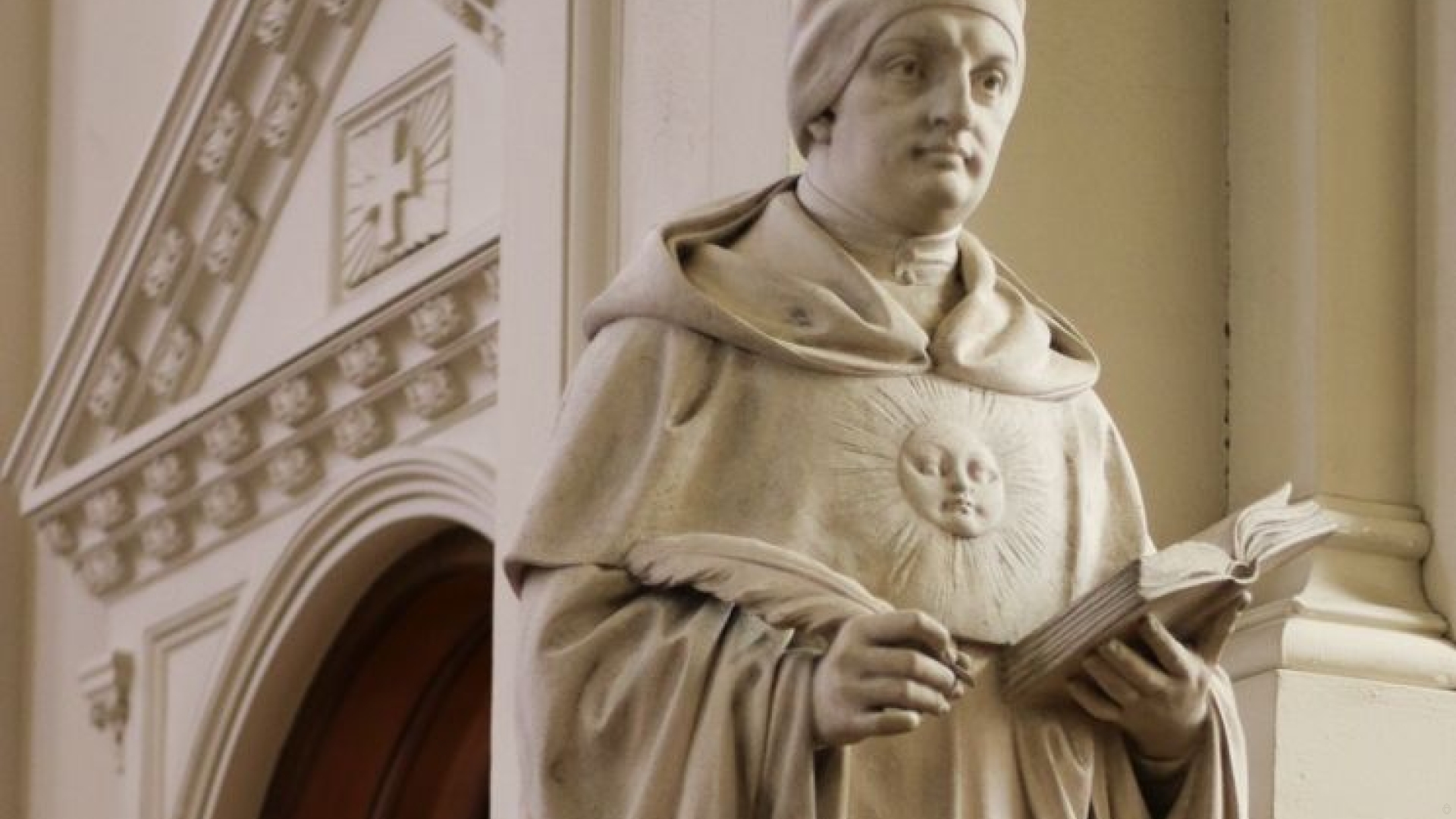
[Suivre saint Thomas dans l’enseignement de la théologie]
Venant maintenant à ce qui regarde proprement la théologie sacrée, Nous voulons que l’étude de cette science soit toujours illustrée à la lumière de la philosophie que nous avons dite ; mais, dans les Séminaires ordinaires des clercs, il sera permis, pourvu qu’il s’y trouve des maîtres compétents, d’avoir les livres de ces auteurs qui exposent en abrégé les doctrines dérivées de la source de Thomas d’Aquin ; et il s’en trouve en ce genre qui sont fort recommandables.
Toutefois, pour cultiver cette science d’une façon plus haute, comme elle doit être cultivée dans les Universités et dans les grands Athénées, et aussi dans tous ces Séminaires et Instituts auxquels a été accordée la faculté de conférer les grades académiques, il faut absolument que, revenant à l’ancienne coutume dont il n’eût fallu jamais s’écarter, il y ait des cours sur la Somme théologique elle-même, pour ce motif encore que ce livre commenté rendra plus facile l’intelligence et l’illustration des Décrets solennels de l’Eglise enseignante et de ses actes venus dans la suite.
Car, après le bienheureux saint Docteur, aucun Concile n’a été tenu par l’Eglise dans lequel lui-même n’ait été présent avec les richesses de sa doctrine. C’est que l’expérience de tant de siècles a fait connaître, et il devient chaque jour plus manifeste, combien vraie était cette affirmation de Notre prédécesseur Jean XXII : « Lui (Thomas) a plus éclairé l’Eglise que tous les autres Docteurs : et, dans ses livres, l’homme profite plus en une année que durant tout le temps de sa vie dans la doctrine des autres. [6] »
Cette pensée, saint Pie V, quand il décida que la fête de saint Thomas comme Docteur serait célébrée par toute l’Eglise, la confirma en ces termes : « Parce que la Providence du Dieu tout-puissant a fait que le Docteur angélique, par la force et la vérité de sa doctrine, à partir du moment où il est entré dans le ciel, a dissipé, en les confondant et les réfutant, les nombreuses hérésies qui sont venues depuis, comme souvent auparavant et comme dernièrement dans les saints Décrets du Concile de Trente la chose est apparue clairement, Nous ordonnons que la mémoire du saint Docteur, dont les mérites libèrent chaque jour l’univers d’erreurs pestilentielles, soit plus encore qu’auparavant l’objet d’un culte inspiré par l’amour d’un cœur pieux et reconnaissant. [7] »
Il Nous plaît aussi, laissant les autres éloges de Nos prédécesseurs, si nombreux et si éclatants, de comprendre, dans ces paroles de Benoît XIV, toutes les louanges des écrits de saint Thomas d’Aquin, surtout de la Somme théologique : « De nombreux Pontifes romains Nos prédécesseurs ont rendu à sa doctrine des témoignages la comblant d’honneur.
« Et Nous-même, dans les livres que Nous avons écrits sur diverses matières, lorsque, en la scrutant avec soin, Nous avons perçu et contemplé la pensée du Docteur angélique, toujours plein d’admiration et de joie, Nous y avons adhéré et souscrit, confessant ingénument que s’il se trouve quelque chose de bon dans ces mêmes livres, ce n’est nullement à Nous, mais à un si grand maître, que le tout doit être attribué. [8] »
C’est pourquoi, « afin que la doctrine de saint Thomas pure et intégrale fleurisse dans les écoles, ce que Nous avons extrêmement à cœur », et que disparaisse « cette manière d’enseigner qui se fonde sur l’autorité et le jugement des maîtres particuliers », et qui, pour ce motif, « a un fondement muable, d’où proviennent des sentiments divers et contradictoires, non sans que ce soit au grand détriment de la science chrétienne [9] » :
Nous voulons, ordonnons, commandons que ceux qui obtiennent la charge d’enseigner la sacrée théologie dans les Universités, les grands lycées, collèges, Séminaires, Instituts qui ont par indult apostolique, le pouvoir de conférer les grades académiques et le doctorat en cette même science, aient comme texte de leurs leçons la Somme théologique et l’expliquent en langue latine, et qu’ils mettent un soin jaloux à susciter à son égard dans leurs auditeurs le plus grand amour.
Ceci est déjà louablement en usage dans plusieurs Instituts ; les très sages fondateurs des Ordres religieux ont voulu qu’il en fût ainsi dans leurs maisons d’études, avec la plus grande approbation de Nos prédécesseurs, et les hommes saints qui sont venus après les temps de saint Thomas n’ont eu que lui comme maître suprême de la doctrine. C’est ainsi et non autrement qu’il arrivera non seulement que la théologie sera ramenée à son premier éclat, mais encore que seront rendus à toutes les sciences sacrées leur ordre et leur valeur, et que tout ce qui est du domaine de l’intelligence et de la raison prendra de nouvelles forces.
Pour ces motifs, à l’avenir, aucun pouvoir de conférer les grades académiques en théologie sacrée ne sera accordé à aucun Institut, à moins que ce qui est ordonné ici par Nous ne soit chez lui saintement observé.
Quant aux Instituts ou aux Facultés même des Ordres ou des Congrégations de réguliers qui ont déjà légitimement le pouvoir de conférer ces sortes de grades académiques ou autres diplômes semblables, même seulement dans les limites de leur Famille, ceux-là en seront privés et devront être tenus comme en étant privés qui, après trois ans, pour quelque cause que ce soit, même nullement volontaire, n’auront point religieusement obtempéré à Notre présente prescription. Et nous statuons ceci sans qu’aucunes choses contraires puissent y faire obstacle.
Donné à Rome, à Saint-Pierre, le vingt-neuvième jour du mois de juin 1914, de Notre Pontificat la onzième année.
Pie X, Pape
[6] Allocation au Consistoire en 1318.
[7] Bulle Mirabilis Deus, du 11 avril 1617.
[8] Actes des chapitres généraux O.P., t. IX, p. 196.
[9] Léon XIII, Lettre Qui te, du 19 juin 1886.
(Source : Actes de Saint Pie X, t. 8, La Bonne Presse - FSSPX.Actualités)
Illustration : Flickr / Jean Louis Mazieres (CC BY-NC-SA 2.0)
